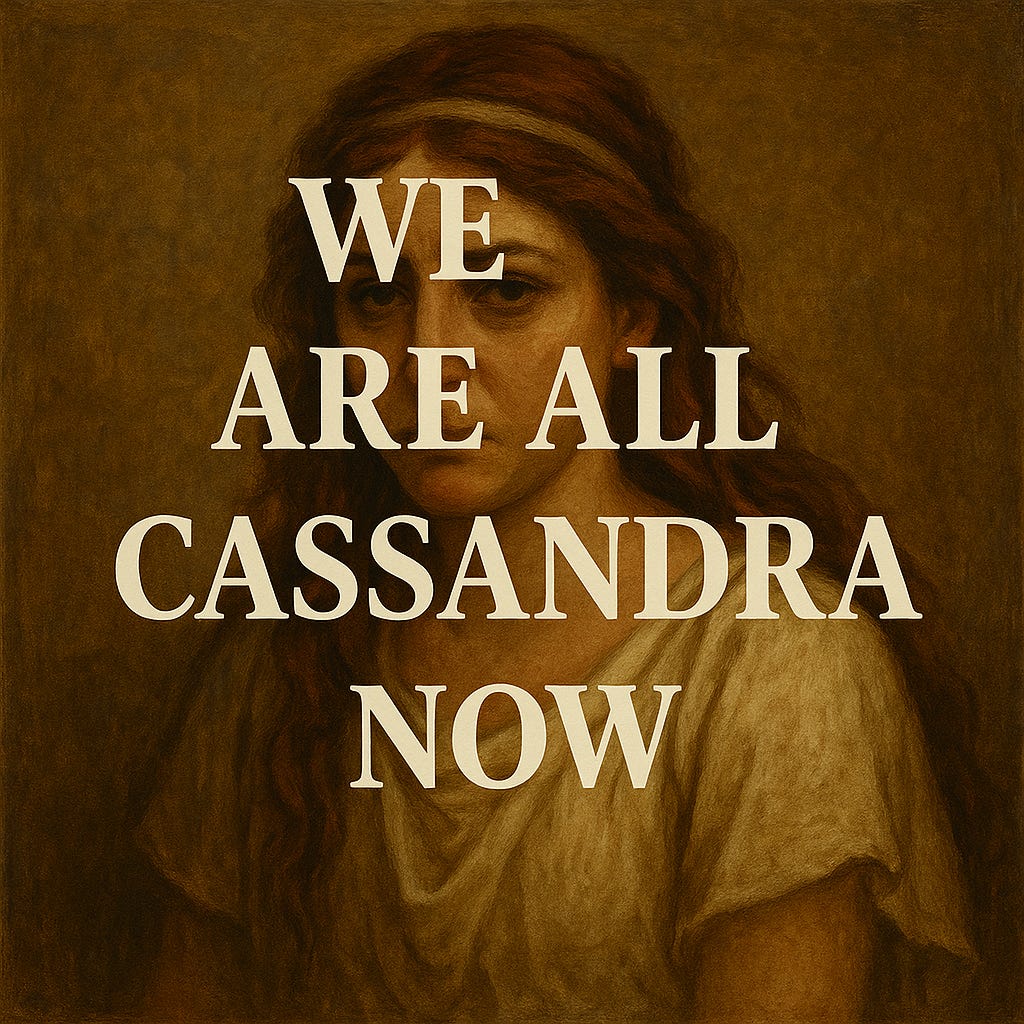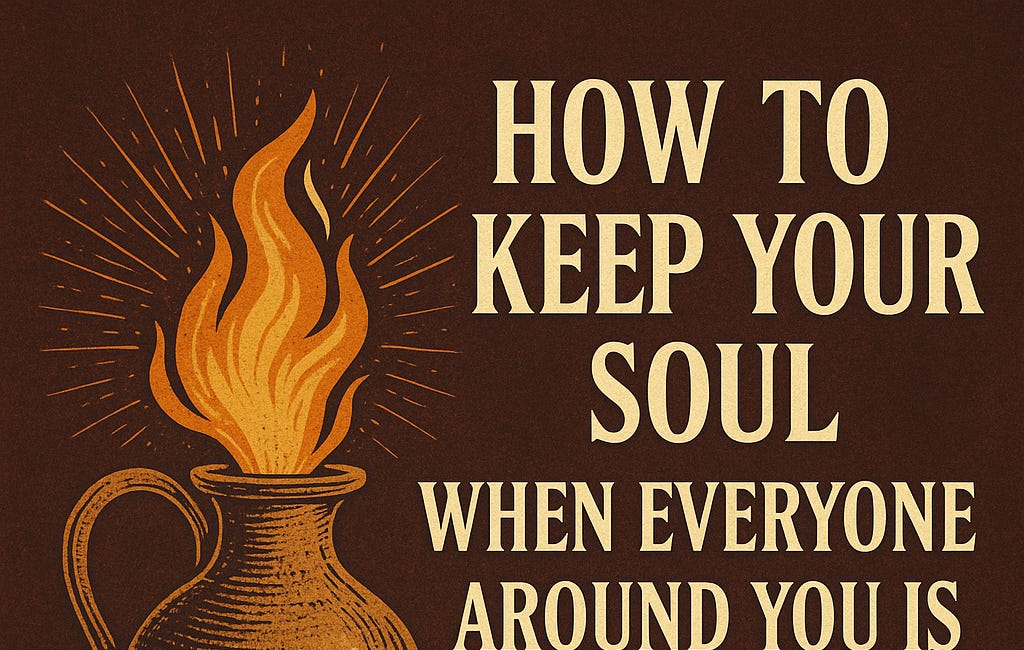We Are All Cassandra Now
The Price of Telling the Truth in the Age of Gaslight-Chronicles of Collapse (with Jokes!)
I. The Curse We Didn't Ask For
Once upon a burning city, there was a girl who saw the truth.
Her name was Cassandra.
Apollo gave her the gift of prophecy, then cursed her so no one would believe a word she said, which is another way of saying that she had perfect insight but zero credibility—a cosmic setup for despair.
She warned Troy that the horse was a trick.
She screamed that it was filled with soldiers.
She begged the city not to roll it through the gates.
And they laughed at her. Or worse—they pitied her.
A mad girl. A doomsayer. Probably hormonal.
Then the soldiers spilled out, and the city fell.
If you’ve ever felt like that—staring at some horrifying inevitability while everyone around you shrugs, scrolls, or smugly reassures you it’s all under control—
welcome. You’re Cassandra now.
II. Speak the Truth, Get the Boot: Cassandras in the 21st Century
Let’s be clear: today’s Cassandras don’t wear togas.
They wear press credentials. Lab coats. Orange jumpsuits.
They are climate scientists warning us for the 27th year in a row that the charts are not just “trending”—they’re screaming.
They are whistleblowers like Frances Haugen, Reality Winner, and Daniel Hale, punished not for lying, but for telling the truth too plainly.
They are independent journalists dragged through lawsuits, bans, and death threats for exposing what everyone suspects but no one wants confirmed.
Cassandra said, “There’s death in the horse.”
Modern Cassandras say, “There’s fascism in the flag. There’s poison in the water. There’s surveillance on the phone.”
And the empire replies, “You’re being very dramatic.”
III. Institutional Gaslight: The Brightest Flame Burns the Facts
This is not the age of darkness.
It’s the age of fluorescent, high-powered, round-the-clock gaslight.
In ancient Troy, Cassandra’s curse was disbelief.
Today, it’s distortion.
You’re not just ignored—you’re interrogated for your tone.
You’re accused of being “biased” for pointing out gravity exists.
"Alarmist."
"Unpatriotic."
"A threat to national security."
Translation: you’re inconvenient.
Just ask climate activists like Dr. Rose Abramoff, who was fired after engaging in peaceful protest about… climate models that her institution published.
Or journalists like Maria Ressa, who are threatened with prison for reporting on government disinformation, are then accused of spreading disinformation.
The modern Cassandra doesn’t die on the battlefield.
She dies on the HR report.
On page 9 of a lawsuit.
In the comment section.
IV. If It Bleeds, They Still Don’t Lead
We now have Cassandras in every field.
Epidemiologists, warning we’re one mutation away from another mass casualty event.
Election officials, begging for safeguards as armed mobs show up at ballot drop boxes.
Teachers, saying “this book ban isn’t about safety—it’s about control.”
The warning signs are lit up like Vegas.
And the collective response?
"Let’s hear both sides."
That’s the thing about Cassandra’s curse—it didn’t say people would ignore her because she was wrong.
It said they wouldn’t believe her even though she was right.
Today’s equivalent is the talking head who says:
“Sure, the forest is burning, but have you considered the economic upside of charcoal?”
V. Historic Cassandras: The Club You Never Wanted to Join
This curse has a long pedigree.
Galileo tried to tell the Church we weren’t the center of the universe. They silenced him.
Sojourner Truth told America what it refused to see about race and womanhood. She was ridiculed, interrupted, dismissed.
Hannah Arendt warned of creeping authoritarianism long before it became fashionable. She died watching it creep anyway.
Rachel Carson warned about the poisoning of the earth. They called her hysterical.
And if you want to go real Old Testament about it—
Jeremiah literally screamed doom in the streets of Jerusalem until they threw him in a cistern.
Every age has its Cassandras.
Every empire ignores them until it’s too late.
And every ruin eventually echoes with their words.
VI. The Personal Cost of Prophecy
There’s a specific kind of loneliness that comes from being right too early.
It’s the feeling of being uninvited to the party because you mentioned the fire code violations.
It’s knowing you can’t unsee the truth, even as others beg you to just play along.
Modern Cassandras deal not just with disbelief, but burnout.
With surveillance.
With smear campaigns.
With doxing, demotions, and subpoenas.
You can lose your job.
Your safety.
Your reputation.
Your peace of mind.
And still, the alternative is worse.
Because if you stop speaking, the silence will eat you alive.
VII. We Are Not Always Cassandra
And sometimes—let’s be honest—we’re not Cassandra.
Sometimes we’re the crowd.
The ones who roll their eyes.
Scroll past.
Say, “I just can’t deal with that right now.”
Sometimes we see the prophet and choose the party.
We all want to believe the horse is just a gift.
That’s how the curse spreads:
not just by muting truth-tellers, but by training the rest of us to doubt the truth on sight.
Because disbelief is a habit.
And denial is a comfort disguised as common sense.
But every time we ignore the voice that sounds the alarm,
we help build the fire that will one day consume us too.
VIII. What the Empire Fears Most
The powerful don’t fear protest.
They fear pattern recognition.
They fear the moment the Cassandras connect.
When the climate scientist teams up with the journalist, who leaks the documents to the activist, who writes the speech the organizer screams into a bullhorn.
Cassandra alone is doomed.
But Cassandras together?
That’s a revolution.
History does give us rare moments when the warning was heard just in time.
Pentagon Papers. Civil Rights marches. Arab Spring.
Moments when the prophets were believed—or at least amplified.
Moments when someone shouted and the crowd shouted back: “We hear you.”
They don’t happen often.
But when they do, history bends.
And that’s why they divide us.
That’s why they slander, isolate, and discredit.
Because if the seers compare notes, the future gets clearer—and the thrones get shakier.
IX. The Eyeliner is Still On
So, what do we do?
We wear the curse like war paint.
We carry the exhaustion and the torch.
We stop waiting for applause and start aiming for impact.
We stay bitter.
We stay knowing.
We stay exhausted—
but we keep our eyeliner on.
Because telling the truth in this era isn’t just brave.
It’s sacred.
And no matter how many empires ignore us, bulldoze us, burn us down—
They still can’t silence everyone.
X. If They Won’t Believe Us, Let Them Remember Us
Maybe the job of a Cassandra isn’t to win the argument.
Maybe it’s to leave a mark on the wall.
To write it down.
To testify.
To record what happened and why.
So when the ruins come—and they always do—someone will read our words and know:
We saw it.
We said it.
They chose not to listen.
But maybe someone will.
Next time.
XI. Final Benediction: For the Ones Who Keep Warning
To the ones who tell the truth and get punished for it.
To the ones who whisper fire into the noise.
To the ones who cannot look away—
You are not wrong.
You are not crazy.
You are not alone.
You are Cassandra.
And you are many.
And your voice matters—even if they try to unhear it.
Speak anyway.
Because someday, in a freer world, someone will thank you for refusing to shut up.
Further Reading







The powerful fears the pattern recognition
They fear the moment the Cassandras connect.
When the climate scientist teams up with the journalist, who leaks the documents to the activist, who writes the speech the organizer screams into a bullhorn.
Cassandra alone is doomed.
But Cassandras together?
That’s a revolution
And let’s not forget why Apollo cursed her - for refusing his advances. A gift once given by a god couldn’t be rescinded, hence that codicil about her never being believed. And, of course, the Greeks never caught on. A lifetime of accurate predictions and they still didn’t believe her.